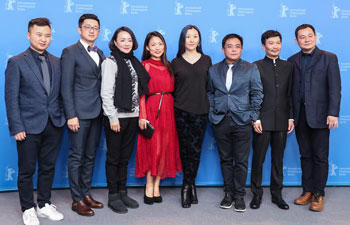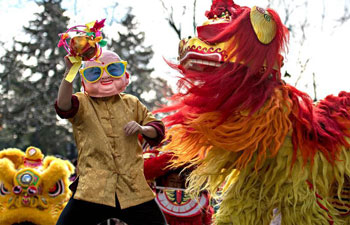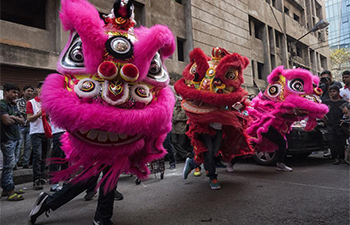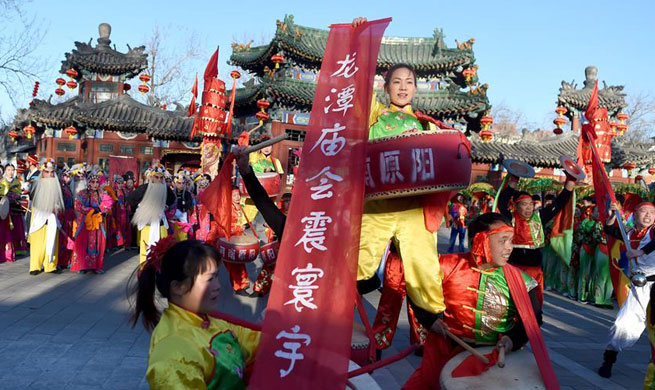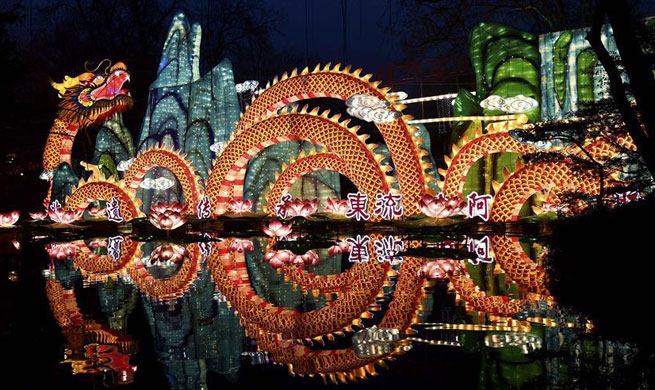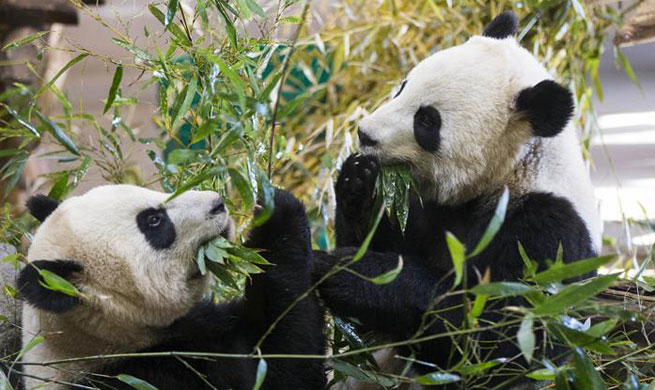by Xinhua writers Huang Anqi, Wu Zhendong and Zhai Xiang
SHANGHAI, Feb. 17 (Xinhua) -- After so many years, memories of a Chinese New Year Eve dinner remain so fresh for Paul Swenson that he can name every dish: eight-treasure rice pudding, seasoned duck, prawns, and his favorite -- spring rolls, which Swenson said looked like "little gold bars."
"Shanghai has become part of my genes," said Swenson, an American businessman of Swedish descent. He first came to Shanghai as an exchange student in 1988.
Having spent almost 30 years in Shanghai, he is now a father of two boys. He serves as managing director of the China Trade Office for Georgia Department of Economic Development and runs a consulting company.
Growing up in a diverse town in Minnesota, Swenson developed an interest in learning languages. By the time he was in college, he already spoke five languages, including Italian, German, and Spanish. On a whim, he chose to study Chinese that was offered as a 7:30 am class during winter.
Swenson met his wife in a taxi in 1996. Soon after the encounter, they became friends and went bowling.
"She was worried that I might be younger than she was, so while we were bowling she asked me my age. When she learned I was six months older, she agreed to a second date," Swenson recalled.
"Before I first visited their home, her parents assumed I was an overseas Chinese," he said. Swenson remembers his mother-in-law studying him as she opened the door, and his father-in-law looking "a little suspicious."
"Our first meeting felt very delicate," he said.
But Swenson's love for his future wife and for the Chinese culture eventually allowed him to merge into this Shanghai family. Though he'd celebrated Spring Festival with his own group of friends before, in 1998 he experienced his first real Chinese New Year's Eve dinner.
Swenson's parents-in-laws live near Tongji University. "My mother-in-law cooked the meal in the kitchen and because my father-in-law was a traditional Shanghai man, he helped too," he said.
"It was a small table but amazing to sit at, because for two hours the dishes just kept coming. The food never seemed to end," he said.
At midnight, Swenson's father-in-law took him out to set off fireworks. "It was bigger than a lot of the fireworks displays I had seen in the United States," Swenson said, adding that the echoes of the fire crackers were incredible to hear.
Twenty years have passed. Swenson's attachment to Shanghai, his second home, has increased over the time. The Chinese New Year, for instance, has also become an important occasion for him. He decorates his home with Spring Festival scrolls and paper cuts, and fills the table with dried fruit, nuts, and sachima, a kind of candied fritter.
Motoyuki Hattori, another foreign spouse, also shared his own fond memories of the Chinese New Year.
Now a research fellow with the School of Life Sciences at Fudan University, Hattori received his bachelor's degree in biochemistry from the University of Tokyo in 2005. He went on to attend Tokyo Institute of Technology for his doctoral studies, where he met his future wife, Jin Yaohua from Shanghai.
After marrying in 2008, Hattori and Jin visited Shanghai the following year for the Spring Festival. It was his first Chinese New Year.
The Spring Festival used to be the most celebrated holiday in Japan. "During the Meiji Restoration, the Japanese government adopted the solar calendar and ceased to celebrate the Spring Festival," Hattori said, noting that today many people in Japan have only a vague memory of this festival.
Hattori enjoyed his 2009 Chinese New Year Eve dinner at a restaurant with around 16 members of the Jin family. He described the dinner as "deluxe," as it was the first time he had ever eaten lobster.
"In Japan, ties between cousins drift apart over the years and they rarely meet each other. At a Chinese New Year's Eve dinner, a big family will all get together. I feel that family ties in China are deep and warm," Hattori said.
"We have New Year's dinner on Dec. 31 in Japan. We prepare simple, mostly cold dishes. But the dishes all have auspicious meanings," Hattori said. "We decorate our home with pines and bamboos, an influence of the Chinese culture."
"My wife also accompanied me to Yu Garden to experience traditional Chinese culture," Hattori recalled.
In Shanghai, there is a tradition of walking across the zigzag bridge in the Yu Garden during the Chinese New Year holiday in order to get rid of problems from the previous year. "There were so many people there that it was difficult to get across."
Hattori joined Fudan's faculty in 2015 and became a member of China's national "1000 Youth Talents Plan."
"The research standards in China are rising and the research environment is getting more inclusive," Hattori told Xinhua. "Many Japanese scholars would now love to work in China."
"I've witnessed China's rapid changes with curiosity and enjoyment," said Hattori. "Watching the Spring Festival gala with my family, extending New Year wishes through mobile red packets... Even if we don't have firecrackers or fireworks, as long as our family gets together, we can still have a busy Chinese New Year."?




